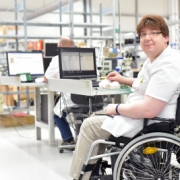Why are we not employing more people with disabilities?
Working in a Mental Health setting, I have been a frontline witness to the many challenges my clients faced in their daily lives. And yet, surprisingly, one of the greatest challenges they had to contend with, had nothing to do with their disabilities per se.
And it’s not a problem that normally comes to mind…
Boredom.
Boredom is something society tends to reserve as a problem only for People without disabilities. But that’s not the case. Nor is it a matter of simply having a bit too much ‘idle time’.
Let’s delve into it a bit more:
Have you ever been unemployed?
I have (does that plummet my Linkedin score?). It’s a week of bliss followed by interminable hours of existential crisis. Without the structure of work, the hours seem like days, the minutes feel like hours, and the seconds crawl past.
Now imagine living like that. Every. Single. Day.
The truth is, unemployment & boredom are far more prevalent afflictions for People with Disabilities than we seem to understand.
And yet, we do appreciate the psychological toll that unemployment & boredom place on People without Disabilities. It is clinically documented that unemployment “damages emotional health”.
The literature cites:
- Lack of structure.
- Damage to self-esteem.
- Increase in Anxiety, self-doubt, & Depression.
- Sense of “helplessness” due to a lack of direction & meaning.
- Sense of disconnection with others & alienation from society.
Why do we assume the heavy, psychological disturbances of unemployment to be reserved only for People without Disabilities?
And there’s another misconception here:
 We tend to think People with Disabilities don’t want jobs. Like employment might somehow be ‘too hard’ for them. An unnecessary addition to their existing challenges and stresses.
We tend to think People with Disabilities don’t want jobs. Like employment might somehow be ‘too hard’ for them. An unnecessary addition to their existing challenges and stresses.
But the fact is, employment is not an additional stress they wouldn’t cope with. It’s a way to empower them. It’s a path to fulfillment, identity, resilience.
And that’s something many People with Disabilities crave. They want to offer value. They want to be contributing members of society.
How would we feel if society only saw us as burdens? Ignored our potential? Refused our offer to contribute?
We’d feel miserable. Disconnected. Inhuman.
Why do we think People with Disabilities are an exception to this? Why do we place the psychological burdens of a lack of structure, meaning, sense of value or self-esteem, onto people who are often already contending with existing emotional challenges?
We seem to think People with Disabilities are too ‘preoccupied’ for employment. But the desire for a sense of meaning, life-direction or self-worth are not lofty goals reserved for the able-bodied & minded, they are fundamental human necessities.
It can be difficult to fill the hours working in an Assisted Living Setting.
Meals and activities can only take up a limited amount of time.
It is the long hours in-between that are the most agitated. And, interestingly, these are also the hours where we’d see the most behavioural incidents. It’s demoralising to have that much time to fill. It is, ironically, too much freedom.
Unfortunately, the solutions offered are fairly band-aid. Doctors offer antidepressant prescriptions. Netflix & Youtube become the defaults to fill the day.
But watching movies from 10am to 5pm, with a break for lunch and a trip to the shops, is not a conducive path to wellbeing. Not for a person who is certainly capable of gainful employment.
Think about it:
If you’d been unemployed for a year, and your Doctor offered you a Sertraline prescription and a few DVD’s to pass the time, how would you feel about that as a solution?
I sincerely believe that every client I’ve ever worked with is capable of at least some degree of employment. And I sincerely believe the lives of every single one of them would be transformed by having a job.
We must shift our attitude towards People with Disabilities, and appreciate them for the resource & value they can offer to the community. If you are an employer, and you have suitable vacancies, I urge you to consider applications from People with Disabilities. Full-time, part-time, ad-hoc or even work-experience.
The benefits will be entirely mutual.
Thanks for reading.
Chris Walkling is a freelance copywriter, specialising in helping social enterprises to build their brand and sell their story.






